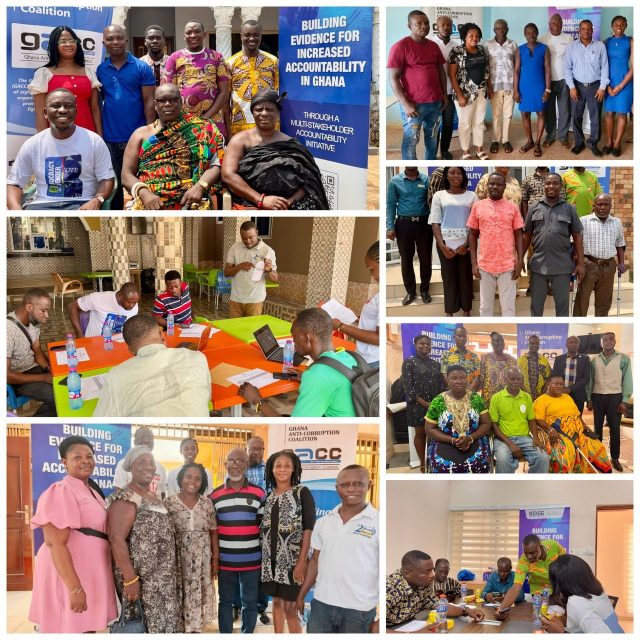The Ghana Anti-Corruption Coalition (GACC) has successfully trained Local Accountability Networks (LANets) in fourteen (14) districts across six (6) regions, equipping them with the skills and knowledge to monitor the implementation of audit recommendations effectively.
This initiative is part of the “Building Evidence for Increased Accountability in Ghana through a Multi-Stakeholder Accountability Initiative project”, supported by the Hewlett Foundation.
Training Conducted Across Multiple Districts
The training sessions were held in Nzema East, Ellembelle, and Sekondi-Takoradi Metropolitan Assembly in the Western Region; Cape Coast Metropolitan Assembly, Mfantseman, and Agona West in the Central Region; Kadjebi in the Oti Region; Atwima Nwabiagya, Kumasi Metropolitan Assembly, Asante Mampong, Ejisu, and Asante Akim in the Ashanti Region; Bibiani Anhwiaso Bekwai in the Western North Region; and Tamale Metropolitan Assembly in the Northern Region.
By reaching these diverse locations, the initiative ensures that accountability and transparency efforts are strengthened across various levels of governance.
Empowering Citizens for Transparency and Accountability
According to Samuel Harrison-Cudjoe, a GACC programmes Officer, the training was designed to empower citizens to enhance accountability, promote transparency, and strengthen advocacy at the local level.
The sessions focused on equipping LANet members with the ability to monitor the implementation of audit recommendations highlighted in the 2023 Auditor-General’s Report.
The monitoring, which will focus on two reports, namely, the Management and Utilization of the District Assemblies Common Fund and other Statutory Funds, as well as the Financial Accounts of District Assemblies will strengthening oversight in ensuring that public funds are properly allocated and utilized for the benefit of local communities.
Enhancing Audit Monitoring and Governance
He emphasized that the training has provided participants with the necessary skills to interpret and use audit reports effectively.
LANets are now better positioned to follow up on the implementation of audit recommendations at the district level and engage Metropolitan, Municipal, and District Assemblies (MMDAs) on their audit recommendations
This initiative is a critical step toward ensuring that audit findings lead to real action and improved governance. By enabling civil society actors to monitor and report on financial mismanagement, the project strengthens Ghana’s overall public financial management system.
Long-Term Goals of the Project
The project, which has been running for four years, aims to enhance transparency and accountability across governance structures. A key focus is ensuring that MMDAs act on the Auditor-General’s recommendations to address financial infractions and improve fiscal discipline.
Another core aspect is monitoring the implementation of the National Anti-Corruption Action Plan (NACAP) to assess whether government agencies are meeting their anti-corruption commitments. Additionally, the project promotes citizen engagement in the fight against corruption by raising awareness through advocacy campaigns in schools, churches, and mosques.
These efforts gained further momentum during the African Union Anti-Corruption Day on July 11 and the International Anti-Corruption Day on December 9.
2024 Training Focus and Key Lessons
As part of this initiative, GACC conducted training for its Local Accountability Networks (LANets) to ensure that LANets can track public financial management issues independently.
While the 2023 training focused on results harvesting, where participants documented the changes observed due to project implementation, the 2024 training emphasized equipping LANet members with the ability to independently analyze and extract key findings from the Auditor-General’s reports.
GACC conducted the training sessions in the 14 project districts. Participants were introduced to the audit process to understand how the Auditor-General conducts audits and prepares reports. They were also trained on how to access audit reports online and extract citations relevant to their respective districts.
Improving Access to Audit Reports
He highlighted that although the Auditor-General’s reports are publicly available, many citizens are unaware of how to access or use them effectively. The training addressed this gap by teaching LANets how to independently obtain the report.
Impact of the Training and Call to Action
Harrison-Cudjoe underscored the significant impact of the training, emphasizing that it has strengthened local accountability mechanisms and increased transparency. Participants have acquired essential skills that enable them to monitor public financial management issues and push for the implementation of audit recommendations.
He urged Ghanaian citizens to take an active role in tracking public funds and engaging local authorities to ensure that financial mismanagement is addressed. He also encouraged government agencies to view citizen oversight as a collaborative effort rather than an adversarial one.
“The role of civil society in monitoring public funds is not about witch-hunting officials, but rather about strengthening public financial management at the district level,” he stated.
GACC’s Continued Commitment to Accountability
He reaffirmed GACC’s commitment to advancing transparency and accountability in Ghana. Adding that, the continued support of the Hewlett Foundation has been instrumental in sustaining these efforts, enabling the coalition to train and empower more citizen monitors across the country.
Source: Isaac Kofi Dzokpo/newsghana.com.gh
Send your news stories to newsghana101@gmail.com
Follow News Ghana on Google News

















